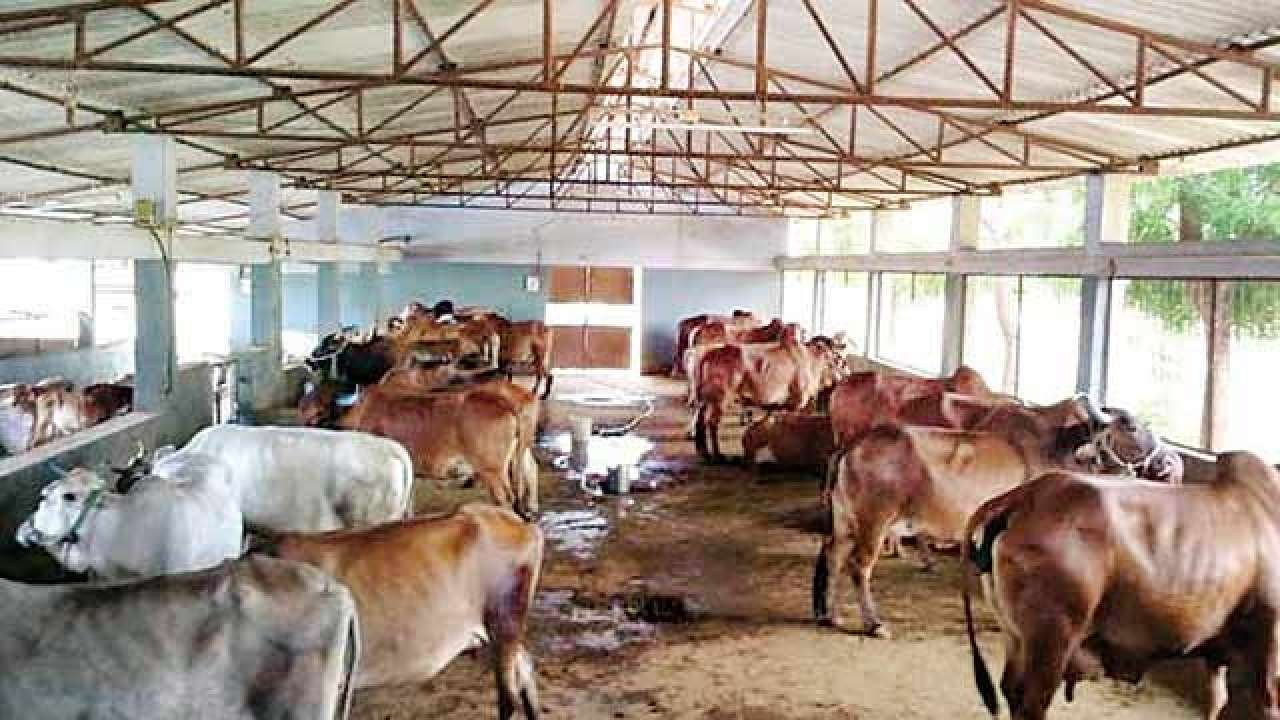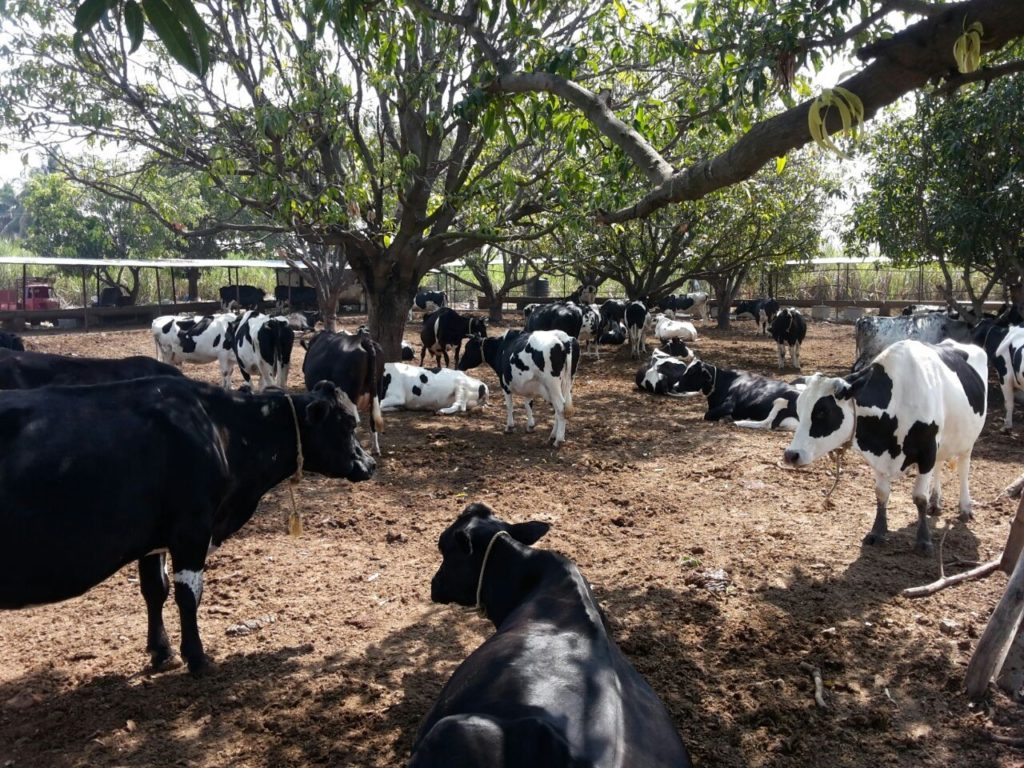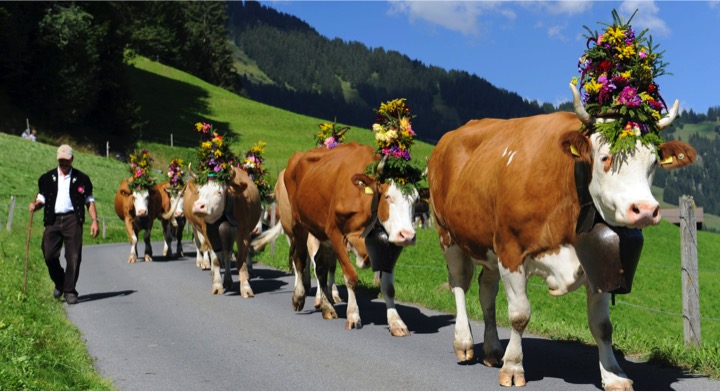Dairy farming is the process of breeding and raising dairy cows for the production of milk, which is used to make various dairy products such as butter, cheese, and yogurt. Dairy farming is an important sector of agriculture and plays a vital role in food production, both in Europe and globally. Here are some key points about dairy farming:

- Breeds: There are many different breeds of dairy cows, but the most common ones in Europe include Holstein, Jersey, and Brown Swiss. Each breed has its unique characteristics, such as milk yield, butterfat content, and temperament.
- Milk production: The amount of milk a cow produces depends on various factors, including genetics, nutrition, and management practices. In Europe, cows are typically milked two to three times a day using automated milking systems or traditional methods.
- Sustainability: Many dairy farms in Europe have implemented sustainable practices to reduce their environmental impact. These include using renewable energy sources, reducing water usage, and managing manure and other waste products.
- Regulations: The dairy industry in Europe is subject to strict regulations, including animal welfare standards, food safety regulations, and environmental regulations. These regulations aim to ensure that dairy products are safe and of high quality.
- Technological advances: The dairy industry has seen significant technological advances in recent years, such as the use of precision farming techniques, automated milking systems, and data analytics. These advances have enabled dairy farmers to improve milk production and reduce their environmental impact.
Overall, dairy farming is an important and complex sector of agriculture, with many challenges and opportunities for innovation and sustainability.

here are the Top 10 Best Dairy Farming Companies In Europe 2023
Arla Foods: Arla Foods is a Danish-Swedish multinational dairy company that was formed in 2000 following a merger between Swedish dairy cooperative Arla and Danish dairy company MD Foods. The company has a presence in over 100 countries and is the largest producer of organic milk in the world. Arla Foods operates under a cooperative model with over 10,000 farmers who supply milk to the company. The company produces a wide range of dairy products including milk, cheese, butter, and yogurt. Arla Foods is committed to sustainability and has set ambitious goals to reduce its carbon footprint and become carbon net zero by 2050.
Arla Foods is a Danish-Swedish multinational dairy company that was formed in 2000 by the merger of two companies, Arla of Sweden and MD Foods of Denmark. The company has a presence in over 100 countries and employs more than 19,000 people worldwide. Arla Foods is the largest producer of organic milk in the world and produces a wide range of dairy products including milk, cheese, butter, and yogurt.
One of the unique aspects of Arla Foods is that it operates under a cooperative model, with over 10,000 farmers who supply milk to the company. The company places a strong emphasis on sustainability, with a goal of reducing its carbon emissions by 30% by 2030. Arla Foods also has a commitment to animal welfare, with a comprehensive animal welfare program in place.
Arla Foods has a diverse product portfolio, with well-known brands such as Lurpak, Castello, and Arla. The company has a strong focus on innovation and has invested in technology to improve its products and processes. For example, Arla Foods has developed a technology called ARLA Food Scanner that allows consumers to scan a product with their phone and receive information about its ingredients and nutritional value.
In addition to its focus on sustainability and innovation, Arla Foods has a strong commitment to social responsibility. The company has established the Arla Foundation, which supports initiatives to promote sustainable agriculture, food security, and education in developing countries. Overall, Arla Foods is a leader in the dairy industry, known for its high-quality products, commitment to sustainability and animal welfare, and innovative approach to technology
Danone: Danone is a French multinational food and beverage company that is known for its dairy products such as yogurt, cheese, and milk. The company was founded in 1919 and operates in over 120 countries. Danone has a strong commitment to sustainability and social responsibility and has set ambitious goals to reduce its carbon footprint and achieve carbon neutrality by 2050. The company also supports small-scale farmers and promotes sustainable agriculture practices. In addition to dairy products, Danone also produces bottled water, baby food, and medical nutrition products.
Danone is a French multinational food and beverage company that was founded in 1919. It is known for its wide range of dairy products such as yogurt, cheese, and milk. The company also produces bottled water, baby food, and medical nutrition products. Danone operates in over 120 countries and has a strong commitment to sustainability and social responsibility.
Danone’s dairy business is divided into two segments: Fresh Dairy Products and Water. The Fresh Dairy Products segment produces and sells yogurt, cheese, and other dairy products under various brands such as Activia, Actimel, and Danette. The Waters segment produces and sells bottled water under brands such as Evian, Volvic, and Badoit.
Danone is committed to sustainability and has set ambitious goals to reduce its environmental footprint. The company aims to achieve carbon neutrality by 2050 and to use 100% renewable energy by 2030. It has also set a goal to achieve zero net carbon emissions for its entire value chain by 2050.
In addition to its commitment to sustainability, Danone has a strong focus on social responsibility. The company has established the Danone Ecosystem Fund, which provides financing and support to small farmers and entrepreneurs in the food industry. The fund has supported over 3,500 projects in 30 countries since its inception in 2009.
Danone has received numerous awards and recognitions for its sustainability and social responsibility efforts. It was ranked first in the food and beverage industry in the 2019 Dow Jones Sustainability Index and has been included in the Corporate Knights Global 100 Most Sustainable Corporations in the World for the past 12 years.
Overall, Danone’s commitment to sustainability and social responsibility, combined with its strong brand portfolio and global presence.
FrieslandCampina: FrieslandCampina is a Dutch multinational dairy cooperative that was formed in 2008 following a merger between Friesland Foods and Campina. The company produces and sells dairy products such as milk, cheese, butter, and yogurt. FrieslandCampina operates in over 100 countries and has over 24,000 member farmers. The company is committed to sustainability and has set ambitious goals to reduce its carbon footprint and become climate-neutral by 2050.
Müller: Müller is a German dairy company that was founded in 1896 and produces and sells dairy products such as milk, yogurt, cheese, and butter. The company operates in Europe and the United States and has a strong focus on innovation and sustainability. Müller is committed to reducing its environmental impact and has set ambitious goals to reduce its carbon footprint and water usage.
Savencia Fromage & Dairy: Savencia Fromage & Dairy is a French multinational dairy company that specializes in cheese production. The company has a portfolio of over 100 cheese brands and operates in over 120 countries. Savencia is committed to sustainability and has set ambitious goals to reduce its environmental impact and support sustainable agriculture practices.
Hochwald Foods: Hochwald Foods is a German dairy cooperative that was founded in 1932 and produces and sells dairy products such as milk, cheese, yogurt, and butter. The company operates under a cooperative model with over 4,000 farmers. Hochwald Foods is committed to sustainability and has set ambitious goals to reduce its carbon footprint and water usage.
Hochwald Foods is a German dairy cooperative that was founded in 1932. It is one of the largest dairy companies in Germany and produces a wide range of dairy products including milk, cheese, yogurt, and butter. The company operates under a cooperative model with over 4,000 farmers who supply milk to the company.
Hochwald Foods has a strong focus on sustainability and has implemented several initiatives to reduce its environmental impact. For example, the company has invested in renewable energy sources such as wind and solar power and has implemented a closed-loop system for milk production to reduce waste and conserve resources. The company also works closely with its suppliers to ensure that they adhere to high standards of animal welfare and environmental sustainability.
In addition to its commitment to sustainability, Hochwald Foods has a strong focus on innovation. The company has invested heavily in research and development and has developed several innovative products such as lactose-free milk and low-fat cheese. The company also operates a state-of-the-art research and development center where scientists and researchers work to develop new products and improve existing ones.
Overall, Hochwald Foods is a well-respected dairy company that is known for its high-quality products and a strong commitment to sustainability and innovation. With its cooperative model and focus on environmental and social responsibility, the company is well-positioned to continue to grow and succeed in the highly competitive dairy industry.
Lactalis: Lactalis is a French multinational dairy company that was founded in 1933 and produces and sells dairy products such as milk, cheese, yogurt, and butter. The company operates in over 100 countries and is the largest producer of cheese in the world. Lactalis is committed to sustainability and has set ambitious goals to reduce its environmental impact and support sustainable agriculture practices.
Emmi: Emmi is a Swiss multinational dairy company that was founded in 1907 and produces and sells dairy products such as milk, cheese, and yogurt. The company operates in Europe, the United States, and Asia and has a strong commitment to sustainability. Emmi is committed to reducing its carbon footprint and has set ambitious goals to achieve carbon neutrality by 2027.
Valio is a Finnish dairy cooperative that was founded in 1905. The company is owned by 4,000 Finnish dairy farmers and produces a wide range of dairy products such as milk, cheese, and yogurt. Valio is known for its high-quality dairy products and has a strong commitment to sustainability.
Valio’s focus on sustainability is evident in its operations, as the company has set a target to be carbon neutral by 2035. To achieve this, the company is investing in renewable energy sources such as wind and solar power, as well as increasing the energy efficiency of its production facilities. Valio is also working to reduce the carbon footprint of its products by optimizing the use of raw materials and minimizing waste.
In addition to its focus on sustainability, Valio is known for its innovation in the dairy industry. The company has developed a range of patented technologies that enable the production of lactose-free and protein-rich dairy products. Valio’s lactose-free products are particularly popular in the Finnish market, where lactose intolerance is common.
Valio is also committed to animal welfare, and all of the company’s member farmers are required to adhere to strict animal welfare standards. The company’s cows are kept in spacious barns with access to outdoor areas, and the use of antibiotics is minimized.
Overall, Valio’s commitment to sustainability, innovation, and animal welfare has helped the company establish itself as a leading dairy producer in Finland and beyond.
Meggle is a German dairy company founded in 1887 that produces and sells dairy products such as milk, cheese, and butter. The company operates in Europe and Asia, with production sites in Germany, Poland, and Ukraine. Meggle’s products are sold in over 120 countries worldwide.
Meggle has a strong focus on innovation and sustainability. The company’s research and development team is constantly working on new products and technologies to improve the quality and safety of its products. Meggle’s innovative approach has led to the development of products such as lactose-free milk and butter, and vegan cheese alternatives.
In terms of sustainability, Meggle is committed to reducing its environmental impact and has implemented various initiatives to achieve this goal. The company has invested in renewable energy sources such as wind turbines and solar panels and has implemented energy-efficient technologies in its production facilities. Meggle also works closely with its suppliers to ensure sustainable sourcing of raw materials and is a member of the Roundtable on Sustainable Palm Oil (RSPO).
Meggle’s commitment to quality and innovation has earned it numerous awards and recognitions, including the prestigious German Innovation Award in 2019 for its lactose-free butter. The company also holds various certifications for its production processes and quality management, such as ISO 9001 and ISO 14001.
Overall, Meggle’s focus on innovation and sustainability has enabled it to maintain its position as a leading player in the European dairy industry, with a strong presence in both domestic and international markets.
Source : Inventiva May 01st 2023

